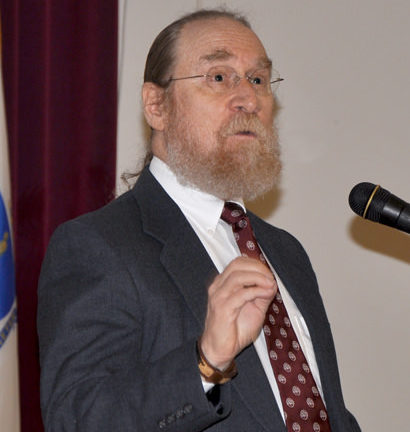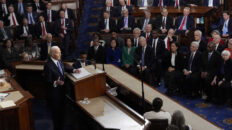“I just joined Liberty.me!”
That’s the whole content of an email I received from a very old friend who is very special to me. He is Sheldon Richman. He is speaking of this digital city just founded as Liberty.me. He is right now working on setting up his own publishing site.
This is my tribute to what he has meant to me and my own life.
I credit this writer for (inadvertently) training me in an important aspect of how to think. He wasn’t my professor. He didn’t lecture to me. All we did was discuss things, random things of passing interest. Every day. But by listening to his own approach to thinking, I discovered a serious deficiency in my own approach and established a new ideal for which I’ve been shooting ever since.
So of course, I was honored and thrilled to have him in our digital society that is growing and growing and doing ever greater things by the day. It’s a new model for distributing and generating ideas, something that has never been tried before, and it turns out he is super excited about it.
Sheldon and I we were both working in Fairfax, Va., and nearly every day for several years, we went to lunch together. We were both interested in politics, libertarian thinking and Austrian School economics.
But politics create bad mental habits. If you are following around a tribe that has “positions on the issues,” it becomes too easy to grab a position and hold it without thinking too much. I’m for this. I’m against that. This is a good guy. This is a bad guy. This is a saint. This is a sinner. This policy is no good. That policy is good.
We are tempted to be self-satisfied by being on the right team, making the right noises, echoing the approved sentiments. Bromide replaces logic. Bluster replaces reasoning.
The trouble is that this is not thinking. This is just the training of a reflex.
You see this habit of mind every day on television. This is how the commentators talk. They assert their views and then argue with each other. The biggest bully wins.
In fact, this is how the whole of modern politics want us to go about things. We are given two simple paradigms in a vending machine. We push this button or that button based on whatever biases we hold. Our product arrives, and we consume it. Then we spit it back out on cue.
Sheldon taught me that holding and consuming opinions is not the same thing as thinking seriously. He taught me this by example.
One of us would throw out a news item. My instinct was to blurt out my opinion. That’s what I did. Sheldon would nod and wait. Then he would begin to offer a series of reasons for holding this view. He would offer up a logical argument. He would cite evidence from history. He would refer to the literature. When he felt that he had made a well-rounded case, he would stop, and then he would raise additional questions and posit possible applications that would generate new topics.
I was always struck by this. He wasn’t doing this to show off or to interrupt the flow of conversation. He did it to satisfy his own craving for intellectual rigor. It was never enough for him to hold the “right view.” He did it to check himself to make sure that he wasn’t operating by habit, but rather that he was capable of making an impenetrable argument that made sense even apart from his own bias.
Why was it is that I wasn’t doing this? Actually, I wasn’t even sure that I could do this. So I began to listen more carefully to how he went about this. I began trying this myself and I discovered that, actually, it is not so easy. It is much easier to just throw out a point of view with the brain very comfortably disengaged. Again, this is how politics want us to going about it. It is far more difficult to actually do the hard work of making a case for or against something using clear reasoning, evidence and citations.
This approach comes through in his writing. Last election season, he wrote a piece on Mitt Romney’s involvement with Bain Capital. It would be very simple to just throw around a bunch of assertions. Instead, he deferred judgment on the precise case and dealt with the whole topic of businesses that have to reverse direction, lay off workers and reformulate their plans. He discussed scarcity, uncertainty, learning, ignorance and change and pointed out that without the ability to adapt to change, no business can truly contribute to the well-being of society over the long term.
It was a classic case of how he goes about thinking. He avoids the easy path and instead makes it hard for himself. As hard as possible. As I came to realize, the reason he does this is because he believes very strongly in the free society. He believes in it so strongly that he does not fear subjecting its positions to relentlessly rigorous questioning and argumentation. If he is wrong about a point, he wants to know where and why he is wrong. He is fearless because he believes in the impenetrability of the idea of liberty. Even if he doesn’t know the answers, he is happy to take the risk of thinking through the case in order to find them.
This is the hard work of thinking. If everyone did this, many myths would melt away, primarily the myth that society and the economy need a strong central hand guiding them or else they will collapse into disorder and chaos. Would that everyone followed this example! But we can’t make others think. All we can do is take responsibility for our own thinking. It is especially incumbent on people who hold a minority position to do this.
By the way, I didn’t agree with everything Sheldon said back then and I don’t agree with him in every case now. But that raises a point. If you have 100% agreement with someone, what could possibly be the point in a give-and-take conversation with the person? If neither of you has anything to learn from the other, what is the point of meeting and discussing at all?
Conversations over ideas should be like exchanges with goods and services. Both parties should show up expecting both to give and to get. The result should be a greater value for both parties than simply what they brought into the conversation. Just as economic exchange increases wealth, so great conversation makes us more enlightened than we would otherwise be.
The lessons I learned during this time with Sheldon have stuck with me for a lifetime.
Part of the idea of Liberty.me is to make this lunchtime experience universal. It is to inspire an intellectual exchange that defies geography and government restrictions. It is to use the technology that private enterprise has given us to create a digital exchange of ideas every day, not so that we can preach to each other, but so that we can learn and grow through exchange with each other.
So of course, I very much welcome Sheldon as a member! It is an honor to have him.














Beautiful. This piece reminds of conversations with friends of mine that, although with contrary positions at the outset, the joy of the argument is in the contest, and both people being left better for it.
It’s such a prevalent notion these days that people shouldn’t discuss ideas, for the sake of not getting “too uncomfortable” with anyone, or “going on to get along”, or “killing the vibe”. I suspect it’s simply their years of government schooling that has taught them how to have adequate imagination in such things.
Even battle can be Play, if approached in the correct spirit.
Beautiful. This piece reminds of conversations with friends of mine that, although with contrary positions at the outset, the joy of the argument is in the contest, and both people being left better for it.
It’s such a prevalent notion these days that people shouldn’t discuss ideas, for the sake of not getting “too uncomfortable” with anyone, or “going on to get along”, or “killing the vibe”. I suspect it’s simply their years of government schooling that has taught them how to have adequate imagination in such things.
Even battle can be Play, if approached in the correct spirit.
The discomfort around discussing ideas is because people are generally not taught informal logic in school. Since they don’t know what logical fallacies are or how to identify them, they have no foundation or skills for engaging in a reason-based conversation. No truth-seeking dialog can stay on the rails for long without having that basic grounding.
https://en.wikipedia.org/wiki/List_of_fallacies#Informal_fallacies
The discomfort around discussing ideas is because people are generally not taught informal logic in school. Since they don’t know what logical fallacies are or how to identify them, they have no foundation or skills for engaging in a reason-based conversation. No truth-seeking dialog can stay on the rails for long without having that basic grounding.
https://en.wikipedia.org/wiki/List_of_fallacies#Informal_fallacies
Thank you, Jeff. This is lovely. I have fond memories of all those lunch conversations, and I can truly say that I got as good as I apparently gave. Venturing out of one’s comfort zone pays off. Also, the principle of charitable interpretation is a mark of decency. If you want to refute a proposition, make sure it’s the strongest possible formulation that you’re tackling. Otherwise, why bother? Your conscience will only bother you. Who needs cheap debating wins? This is life not high school.
I couldn’t be more excited about participating in Liberty.me.
Thank you, Jeff. This is lovely. I have fond memories of all those lunch conversations, and I can truly say that I got as good as I apparently gave. Venturing out of one’s comfort zone pays off. Also, the principle of charitable interpretation is a mark of decency. If you want to refute a proposition, make sure it’s the strongest possible formulation that you’re tackling. Otherwise, why bother? Your conscience will only bother you. Who needs cheap debating wins? This is life not high school.
I couldn’t be more excited about participating in Liberty.me.
Wonderful!
I’ve had the privilege of working with Sheldon for a few years now, and I have been enriched time and again by his cogent, fearless, patient approach to thought.
Welcome to Liberty.me, Sheldon!
Wonderful!
I’ve had the privilege of working with Sheldon for a few years now, and I have been enriched time and again by his cogent, fearless, patient approach to thought.
Welcome to Liberty.me, Sheldon!
Thanks, Mike! It’s a pleasure to work with you.
Thanks, Mike! It’s a pleasure to work with you.